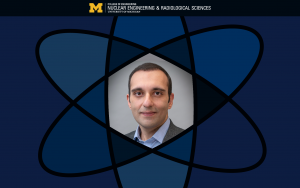Presented By: Nuclear Engineering & Radiological Sciences
NERS Colloquium: Nuclear Power for Deep Decarbonization: Insights from Recent Modeling
Speaker: Professor Ahmed Abdulla, Assistant Research Professor, Engineering and Public Policy, Carnegie Mellon University

Abstract
Avoiding the worst consequences of climate change hinges on the transition to a deeply decarbonized global energy system. The development and deployment of promising, low-carbon energy technologies that could facilitate this transition—including nuclear power—is severely constrained by non-technical factors, including economics, but especially socio-political factors. This talk will present two new, interdisciplinary methods for evaluating some of these constraints. First, recent research on the performance of U.S. advanced fission innovation will be presented: this research has generated a new approach for evaluating technology development programs sponsored by the federal government. Second, insights will be presented from a recent study on the role of public opposition in constraining the deployment of nuclear power for decarbonization. This research is being extended to endogenously integrate societal preferences regarding energy technologies into energy system optimization models. Failure to integrate socio-political constraints leads to mathematically feasible, but socially unacceptable, decarbonization pathways, rendering greenhouse gas mitigation yet more difficult. This new wave of research, grounded in industrial engineering and the decision sciences, seeks to inform the design of emerging energy systems and to improve decision making by technology developers, policy makers, and researchers.
Speaker Bio
Ahmed Abdulla is Assistant Research Professor in the Department of Engineering and Public Policy at Carnegie Mellon University. His research investigates the deployment of emerging energy systems; specifically, it optimizes the design of these energy systems and seeks to integrate real-world constraints into energy system models. Dr. Abdulla’s work has been supported by the Alfred P. Sloan Foundation and the MacArthur Foundation, among others. Results from his research have been published in leading journals, including "Nature Climate Change" and the "Proceedings of the National Academy of Sciences;" they have also been featured in the "Wall Street Journal," "Bloomberg News" and "The Los Angeles Times." Prior to Carnegie Mellon, Dr. Abdulla was Assistant Research Scientist in the Center for Energy Research at the University of California, San Diego. He holds a PhD in Engineering and Public Policy from Carnegie Mellon University and a BS in Chemical Engineering from Princeton University.
Avoiding the worst consequences of climate change hinges on the transition to a deeply decarbonized global energy system. The development and deployment of promising, low-carbon energy technologies that could facilitate this transition—including nuclear power—is severely constrained by non-technical factors, including economics, but especially socio-political factors. This talk will present two new, interdisciplinary methods for evaluating some of these constraints. First, recent research on the performance of U.S. advanced fission innovation will be presented: this research has generated a new approach for evaluating technology development programs sponsored by the federal government. Second, insights will be presented from a recent study on the role of public opposition in constraining the deployment of nuclear power for decarbonization. This research is being extended to endogenously integrate societal preferences regarding energy technologies into energy system optimization models. Failure to integrate socio-political constraints leads to mathematically feasible, but socially unacceptable, decarbonization pathways, rendering greenhouse gas mitigation yet more difficult. This new wave of research, grounded in industrial engineering and the decision sciences, seeks to inform the design of emerging energy systems and to improve decision making by technology developers, policy makers, and researchers.
Speaker Bio
Ahmed Abdulla is Assistant Research Professor in the Department of Engineering and Public Policy at Carnegie Mellon University. His research investigates the deployment of emerging energy systems; specifically, it optimizes the design of these energy systems and seeks to integrate real-world constraints into energy system models. Dr. Abdulla’s work has been supported by the Alfred P. Sloan Foundation and the MacArthur Foundation, among others. Results from his research have been published in leading journals, including "Nature Climate Change" and the "Proceedings of the National Academy of Sciences;" they have also been featured in the "Wall Street Journal," "Bloomberg News" and "The Los Angeles Times." Prior to Carnegie Mellon, Dr. Abdulla was Assistant Research Scientist in the Center for Energy Research at the University of California, San Diego. He holds a PhD in Engineering and Public Policy from Carnegie Mellon University and a BS in Chemical Engineering from Princeton University.